MEDIA FOR CHANGE NETWORK
Oil activities in Murchison Falls National Park threaten Wildlife Conservation – AFIEGO study reveals.
Published
2 years agoon
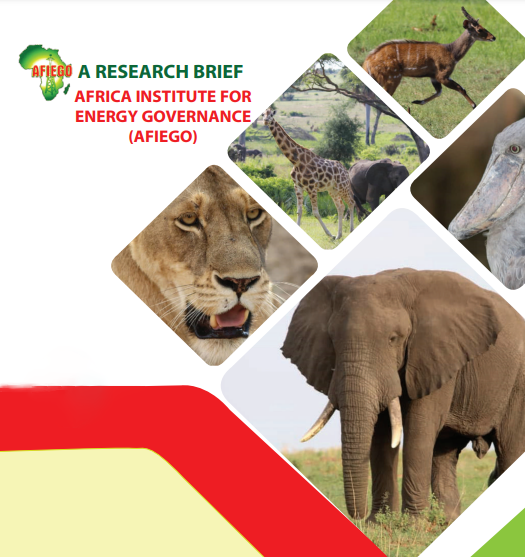
By Witness Radio team.
A study conducted by the Africa Institute for Energy Governance (AFIEGO) and its partners has revealed that oil development activities are threatening the existence of Wildlife conservation at Murchison Falls National Park (MFNP).
Uganda has 10 National Parks including Queen Elizabeth, Lake Mburo, Murchison Falls, Kidepo Valley, Kibale, Mount Elgon, Rwenzori Mountains, Semuliki, Mgahinga Gorilla, and Bwindi Impenetrable National Parks and are managed by Uganda Wildlife Authority, (UWA).
Murchison Falls National Park, one of the oldest and most visited national parks in Uganda, is highly attractive to tourists due to its rich biodiversity. According to the Ministry of Wildlife, Tourism, and Antiquities’ 2024 report, Murchison Falls National Park received the highest number of tourists among all the national parks in Uganda between 2019 and 2023.
Data from Ministry of Tourism shows that in 2023, the Murchison park received 141,335 visitors which is equivalent to 36.4% of the 387,914 tourists that visited Uganda’s ten national parks.
The 24-page document titled Murchison Falls National Park is dying: How oil activities, climate change, and poaching are negatively reshaping the Park’ reveals that the Tilenga oil project infrastructural development presents immense risks to Murchison Falls National Park.
The Tilenga Oil project, part of the East African Crude Oil Pipeline (EACOP) is operated by Total Energies E&P (U) B.V. According to the EACOP website, EACOP is being constructed in parallel with two upstream development projects known as Tilenga and Kingfisher respectively.
Between February and June 2024, AFIEGO and partners conducted research to assess the progress of the development of the Tilenga oil project infrastructure and to examine the impact of this infrastructure on biodiversity.
In Murchison Falls National Park, oil sector infrastructure such as drilling rigs, well pads, flowlines, pipelines, roads, and others are being developed to enable commercial oil production by TotalEnergies under the Tilenga oil project.
Findings reveal that there has been progress in developing oil sector infrastructure in park assessed through satellite images. According to the study analysis of May 2024, satellite imagery shows rapid development of the tens of well pads and clearing for roads and the pipeline network inside the park.
The progress in oil development has had chilling effects on humans and biodiversity. Findings from the study expressed growing concern and fear towards light pollution, increased poaching risks, and increased motorization. Elephants are invading different areas of residence because of vibrations from the oil rig.
Among the impacts seen is the escape of wild animals from the park and the killing of people neighboring it. The study reveals that between 2023 and April 2024 in Buliisa district, five people have been killed by elephants. Oil host communities that live around the Park reported that elephants are moving from the Park and are invading communities destroying croplands and killing people.
According to experts in the study, the elephants could feel the vibrations from the drilling rig in their feet which causes them to move away from the Park and into communities.
The study also noted that the Tilenga oil project drilling rig is responsible for increasing light pollution in the Park and the surrounding communities. The light from the rig can be seen at long distances up to 13.9km away. Concerns were raised by this research’s respondents, who observed that the feeding and other patterns of nocturnal and light-sensitive wildlife could be negatively impacted by the rig’s light pollution. Such wildlife includes leopards, lions, birds, and others. These could migrate from the Park, or suffer worse impacts such as death.
Away from the above, the study observed that the paved roads that have been constructed in Park to support the Tilenga oil project activities have opened it up to more motorised traffic exposing wildlife to poaching, accidents as well as noise and air pollution.
Furthermore, Well-pads are located an estimated 950 and 750 metres respectively from the Murchison Falls-Albert Delta Ramsar Site in Park which is an Important Birding Area and important spawning ground for the Lake Albert fisheries.
“The development of good pads near the Ramsar site has been implicated in risking the conservation of aquatic biodiversity such as water birds especially the vulnerable Shoebill, fishes, and mammals like the hippopotamus” the study mentioned.
Additionally, the development of well pads and other oil sector infrastructure were also implicated in increasing the human population in Park. “The presence of human beings has been shown to lead to avoidance by wildlife, especially larger mammalian predators, of areas where human beings are. Wildlife such as the Uganda Kob was said to be slowly acclimatizing to the human presence and can be found near oil sector workers”. The study revealed.
Also, it pins oil activities in the Northern sector of the Park where the rig that will drill the Jobiri wells is located, the Northern side is characterized by savanna vegetation hosting more wildlife than the Southern sector, endangering the conservation of the savanna grasslands. According to experts in the study, predators such as lions, hyenas, leopards, and others also prefer to live in the Northern sector of the Park where they can easily access prey among others.
This study was released barely a few weeks after a group of 828 civil society organizations (CSOs) led by Afiego, oil host communities, fisherfolk, small-scale farmers as well as tour and travel operators, and other individuals from Uganda and the Democratic Republic of Congo (DRC) petitioned President Yoweri Kaguta Museveni to stop the ongoing TotalEnergies’ oil drilling in Murchison Falls National Park and its planned deployment of a second oil rig in the Park.
The petition followed reports that Total Energies E&P (U) B.V. was sweet-talking the President to allow them to deploy the second rig in the Park following the Petroleum Authority of Uganda’s (PAU) refusal, to allow them to deploy another oil rig in the Park over biodiversity conservation concerns.
As Total looks to add more oil rigs escalating the impacts, the recent study reveals that its current infrastructural projects—including oil rigs, well pads, pipelines, and roads—continue to cause negative impacts on biodiversity conservation in the Park.
In a bid to strengthen biodiversity conservation, the research study recommends that TotalEnergies and the Ugandan government stop all oil exploitation activities in the Park and calls for the intervention of the United Nations (UN), Ramsar secretariat, and UNESCO World Heritage Committee to engage the Ugandan government to stop the oil activities in Park.
Furthermore, the Ugandan government and development partners called upon to support the Uganda Wildlife Authority (UWA) in addressing risks such as climate change, poaching, and human-wildlife conflicts that are endangering the conservation of vital wildlife that supports the multi-billion tourism and other industries in Uganda.
The Uganda Wildlife Authority refused to comment on the study findings. The spokesperson of the Authority Mr. Bashir Hangi in an interview with Witness Radio said he was unable to comment on its contents.
“We haven’t read the detailed report and cannot comment on its contents. Allow us to read the report,” he wrote in a WhatsApp text message to Witness Radio.
Dr. Patricia Litho Kevin, the Assistant Commissioner for Communication in the Ministry of Energy and Mineral Development, acknowledged that there are potential risks associated with oil exploration and production, a reason why they established robust regulations, monitoring mechanisms, and contingency plans to prevent and respond to any environmental incidents.
She adds that the Government of Uganda is committed to ensuring that the oil projects are executed in an environmentally sustainable and responsible manner because it also understands the importance of preserving the natural heritage and biodiversity.
Related posts:

 Conservationists want Bugoma Forest made national park
Conservationists want Bugoma Forest made national park
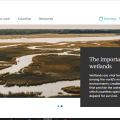 61 CSOs want Ramsar Wetlands affected by EACOP and Tilenga projects in Uganda and Tanzania to be listed in the Montreux Record.
61 CSOs want Ramsar Wetlands affected by EACOP and Tilenga projects in Uganda and Tanzania to be listed in the Montreux Record.
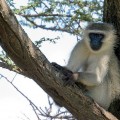 Destroying Bugoma will block wildlife migration corridor
Destroying Bugoma will block wildlife migration corridor
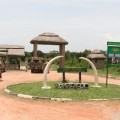 We won’t leave Queen Elizabeth park land, Rukungiri locals insist
We won’t leave Queen Elizabeth park land, Rukungiri locals insist
You may like
MEDIA FOR CHANGE NETWORK
Indigenous communities in Eastern Nepal accuse the World Bank’s Linked Cable Car Project of rights violations.
Published
51 minutes agoon
February 2, 2026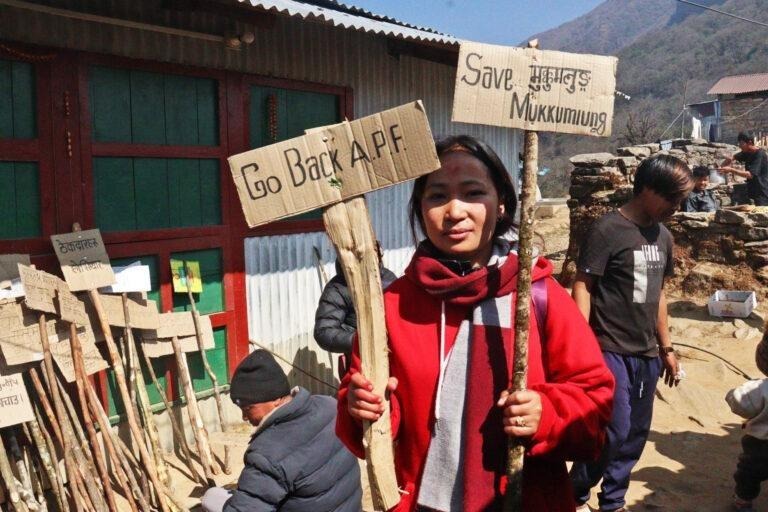
Indigenous communities in Eastern Nepal accuse the World Bank’s Linked Cable Car Project of rights violations.
By Witness Radio Team
A $22 million cable car project cutting through sacred forests in eastern Nepal has become the centre of a growing dispute. Indigenous communities accuse developers and the World Bank Group of enabling forced development that violates community land rights and exacerbates human rights abuses.
The project, whose construction began in 2022, is developed by Pathibhara Devi Darshan Cable Car Pvt. Ltd., a subsidiary of Nepal’s powerful IME Group, and is being built on Mukkumlung Mountain, also known as Pathibhara, in Taplejung District. While the government has promoted the project as a tourism and accessibility initiative, the Indigenous Yakthung (Limbu) communities say construction has proceeded without their consent and at a high cultural and environmental cost.
According to the project’s Initial Environmental Examination (IEE), the cable car infrastructure would occupy 6.22 hectares (15.36 acres) of community and government forest land.
Community leaders opposing the project say it threatens local livelihoods and social structures, including more than 700 local porters, nearly 30 locally run small businesses, and approximately 1,700 households that depend on pilgrimage-related income. They also warn of irreversible damage to cultural heritage sites.
The cable car intends to transport pilgrims to the Pathibhara Devi temple, one of Nepal’s most revered Hindu shrines, which is currently accessible only via a steep, high-altitude trek. Project developers argue the cable car will boost tourism, generate employment, and allow elderly and disabled devotees easier access.
For the Yakthung people, Mukkumlung is not merely a pilgrimage site but a sacred ancestral land that embodies their spirituality, culture, and identity.
“This mountain is sacred ancestral land. It defines our spirituality, culture, and customary law,” said Advocate Shankar Limbu, vice-chair of the Lawyers’ Association for Human Rights of Nepalese Indigenous Peoples (LAHURNIP). “Clearing forests and altering the mountain’s ecology weakens its spiritual power and violates our collective rights.”
Local leaders say they were never consulted before construction began, highlighting a clear violation of their rights and raising concerns over FPIC breaches.
“The IFC’s own Performance Standards state that Indigenous Peoples have the right to give Free, Prior and Informed Consent to projects on their lands,” said Saru Singak of the Mukkumlung Conservation Joint Struggle Committee. “But no one ever asked us whether we wanted this project. It is destroying forests and sacred landscapes and disrespecting our religion and culture.”
Environmental groups report that construction has already felled over 10,000 trees, including
protected species like Himalayan yew, threatening local biodiversity.
As forest clearing accelerated, opposition from local communities intensified. In January 2025, Nepal Police and Armed Police Force personnel reportedly used force against protesters, leading to the detention of dozens and sustaining severe injuries. Activists allege continued intimidation and retaliation against those opposing the project.
The dispute has drawn international attention, especially as the World Bank Group faces mounting scrutiny over financing harmful investments. Between August 2022 and July 2024, the IFC provided advisory services to the IME Group for four cable car projects in Nepal, including the Pathibhara project.
Indigenous leaders argue that during this period, the IFC failed to ensure compliance with its Environmental and Social Performance Standards, particularly regarding environmental assessments and the respect for communities’ right to Free, Prior, and Informed Consent, raising questions about its oversight and accountability.
In August 2025, Yakthung communities, supported by lawyers and civil society organisations, filed a formal complaint against the World Bank Group, alleging breaches of safeguarding standards that led to human rights abuses and the destruction of cultural heritage. In December 2025, the World Bank Group’s independent watchdog, the Compliance Advisor Ombudsman (CAO), formally registered the complaint and is currently assessing whether to proceed with mediation or a full compliance investigation.
For Indigenous rights advocates, the Pathibhara dispute reflects a broader pattern seen in World Bank–linked projects across Africa, Asia, and Latin America, where development initiatives proceed without meaningful community participation and accountability mechanisms are activated only after harm occurs, yet rarely provide a remedy.
A decade ago, an 11-month investigation by the International Consortium of Investigative Journalists (ICIJ), Evicted and Abandoned, found that an estimated 3.4 million people were physically or economically displaced by World Bank–funded projects, raising long-standing concerns over the institution’s ability to protect vulnerable communities.
IME Group operates across energy, manufacturing, infrastructure, and trade, and owns Global IME Bank, Nepal’s largest commercial bank. The IFC has provided more than $50 million to IME Group over the past decade.
Related posts:

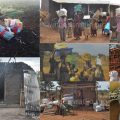 Thirty-six (36) groups from all over the world have written to industrial agriculture investors, Agilis Partners Limited to stop human rights violations/abuses against thousands of indigenous/local communities, settle grievances, and return the grabbed land.
Thirty-six (36) groups from all over the world have written to industrial agriculture investors, Agilis Partners Limited to stop human rights violations/abuses against thousands of indigenous/local communities, settle grievances, and return the grabbed land.
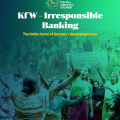 A German Bank is under intense scrutiny for its irresponsible banking practices, which have been directly linked to displacement and human rights abuses.
A German Bank is under intense scrutiny for its irresponsible banking practices, which have been directly linked to displacement and human rights abuses.
 Know Your Land rights and environmental protection laws: a case of a refreshed radio program transferring legal knowledge to local and indigenous communities to protect their land and the environment at Witness Radio.
Know Your Land rights and environmental protection laws: a case of a refreshed radio program transferring legal knowledge to local and indigenous communities to protect their land and the environment at Witness Radio.
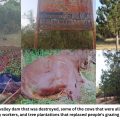 Profiting from misery: A case of a multimillion-dollar tree project sold off before resolving land grab and human rights violation claims with local communities.
Profiting from misery: A case of a multimillion-dollar tree project sold off before resolving land grab and human rights violation claims with local communities.
MEDIA FOR CHANGE NETWORK
Why govt is launching a comprehensive digital land registry
Published
2 days agoon
January 31, 2026
COMMENT | DAVID MUWONGE | Land has historically symbolized wealth and power. In the past, kingdoms expanded their influence by acquiring new territories.
This pursuit continued into the colonial era, spanning the 15th to the 20th centuries, with European powers scrambling for control over Africa. They were driven by a desire not just for human labour but also for large amounts of agricultural land, political power, and the raw materials needed to fuel the Industrial Revolution in the West. As a result, the distribution and management of land became increasingly complex.
In Uganda, the colonial era ushered in the 1900 Buganda Agreement, a turning point in the nation’s land history. Among its key provisions was land reform. It introduced the mailo system at the center of it all. Under this agreement, large estates were divided. About 8,000 square miles were granted to roughly 1,000 chiefs and landowners, establishing a unique land tenure system. These changes have had lasting effects on Uganda’s approach to land ownership and governance.
Over time, this structure evolved into the four land tenure systems recognized by the 1995 Uganda Constitution: customary (traditional communal or family-based ownership), freehold (absolute ownership), mailo (a system with distinct rights for owners and tenants), and leasehold (land held for a fixed term under a lease agreement, often with rent payments).
However, even as the land tenure system evolved by law to include leasehold, controversy persisted, especially regarding government land. This ongoing tension highlights the need to address historical challenges while adapting to modern realities.
This is partly because there is no comprehensive, up-to-date inventory of government land, and the Uganda Land Commission’s limited district presence. Thus, significant tests in managing and protecting government land, making it vulnerable to mismanagement and encroachment.
Recognizing these challenges, the Government of Uganda is now taking decisive steps to modernize land management systems and restore confidence in public land administration. The government is launching a digital land inventory through the Uganda Land Commission, aiming to secure, monitor, and ensure transparent management of all state-owned land.
The Uganda Land Commission (ULC), established under Article 238 of the Constitution, is tasked with holding and managing all land in Uganda vested in or acquired by the state, ensuring it is protected, put to proper use, and fully accounted for.
According to Tom John Fisher Kasenge, a commissioner at Uganda Land Commission, much of the government land has been encroached upon. Government land includes all property managed or held by ministries, departments and agencies (MDAs), government schools, health centres, hospitals, police stations, prisons, offices, farms, and army barracks. It also covers land under the National Forestry Authority. ULC is the custodian of this land and holds the titles on behalf of all MDAs.
“This inventory will also go a long way in helping to solve land disputes, wrangles and conflicts that are over land management and ownership in the country,” Kasenge remarked.
“There is a big problem now, as we talk, in distinguishing between land owned by the government and managed by the Commission; land under the Buganda Land Board; and land under the authorities, like the local governments and the cities,” Kasenge added.
“Because of that lack of accuracy in the boundaries and extent of the land and the jurisdiction of each of these bodies.”
The Land Commission’s priority is to create a digitized, accurate inventory of all government land to close information gaps. By bridging the current information divide, this initiative seeks to support proper planning, protect against encroachment, and encourage investment in projects, recognizing land as a vital national resource.
“So, planning for this land becomes very crucial at the moment that the NRM government has attracted a lot of investors, and every now and then, these investors would like to put their projects in various places around the country,” Kasenge observed. This further emphasizes the importance of reliable land records for national development.
With updated digital land records, the Commission expects to resolve disputes, reduce misallocation, and ensure efficient use of public land. These improvements are expected to build greater transparency and accountability in land administration.
Revenue Collection
Many occupants of government land are not paying ground rent largely due to limited awareness and the absence of formalized tenure, a situation that continues to affect national revenue, Kasenge revealed.
He explained that to address this gap, the Uganda Land Commission (ULC) is rolling out a new system that will regularly remind lessees of their ground rent obligations and notify them ahead of lease expiry dates, a move aimed at improving compliance.
Kasenge further noted that correcting erroneous freehold titles will allow affected lessees to regularize their tenure. This will also enable the government to collect due ground rent. He emphasizes that stronger land administration and improved revenue collection are critical to better service delivery and to ensuring government land benefits both the state and citizens.
Currently, ULC has a Financial Year revenue target of UGX 7 billion from ground rent and leases on government land. After the digitized, GIS-enabled (Geographic Information System) inventory is fully rolled out, the Commission expects collections to rise to about Shs12 billion in the first three years. Revenues are projected to gradually increase to as much as Shs40 billion in the long term.
Local governments and technical officers are playing a key role in supporting the nationwide exercise through boundary verification, data sharing and identification of government land. Their contributions include providing physical planning and land-use guidance, protecting environmentally sensitive areas, and engaging communities to raise awareness and build cooperation.
The Land Commission assures the public and current lessees that the inventory exercise is not intended to trigger evictions but is focused on documentation, compliance and improved land governance. Addressing public concerns remains central to the Commission’s approach, with an emphasis on fairness and openness throughout the process.
Uganda Land Commission has formally written to all ministries, departments and agencies (MDAs), requesting details of land under their custody and the nomination of focal persons to work with the Commission in developing a comprehensive inventory, a request that has received positive responses.
In addition, the Commission has engaged 16 town clerks from cities and municipalities. It has reviewed its own records and those of the National Land Information System (NLIS), a centralized digital platform for managing national land records, to verify government land details. The Commission has also partnered with the Ministry of Lands, Housing and Urban Development (MLHUD) to support the exercise through surveying, valuation, and titling. These collaborative efforts highlight the collective responsibility needed to address longstanding land challenges and a need to strengthen accountability, improve compliance, and enhance management of government land across the country.
As the digital registry project continues, ongoing collaboration among government agencies, local authorities, and the public will be crucial to its success. Sustained commitment and transparent communication will ensure that the benefits of improved land management are realized for all Ugandans.
Source: independent.co.ug
Related posts:

 Uganda’s president stops plans seeking to review and amend the Land Act CAP 227 that sought to curb widespread illegal land evictions.
Uganda’s president stops plans seeking to review and amend the Land Act CAP 227 that sought to curb widespread illegal land evictions.
 Govt launches Central Account for Busuulu to protect tenants from evictions
Govt launches Central Account for Busuulu to protect tenants from evictions
 Govt resurrects emotive Land Acquisition Bill.
Govt resurrects emotive Land Acquisition Bill.
 New digital tool to empower farmers to access extension services
New digital tool to empower farmers to access extension services
MEDIA FOR CHANGE NETWORK
Witness Radio and Seed Savers Network are partnering to produce radio content to save indigenous seeds in Africa.
Published
5 days agoon
January 28, 2026
By Witness Radio team.
Across Africa, indigenous seeds are vital, climate-resilient, and culturally significant resources that smallholder farmers deeply value for biodiversity and food sovereignty.
Today, however, these traditional seed systems face threats from commercial seed interests, restrictive laws, and policies that may impact farmers’ rights. Addressing these concerns directly can help farmers understand how the program supports their legal and cultural rights.
In response to this growing challenge, Witness Radio Uganda, in partnership with the Seed Savers Network (SSN) in Kenya, is launching a radio broadcast titled “The Struggle to Save Cultural Seeds in Africa.”
Witness Radio and Seed Savers in Africa aim to use the radio as a tool to organize, mobilize, and empower smallholder farmers across Africa and beyond.
Food production and consumption patterns in Africa have changed significantly since the pre-colonial era. The gradual introduction of exotic crops, the establishment of settler farms on land seized from local communities, and the shift from agroecological practices to agrochemical-dependent and mechanized agriculture have disrupted indigenous food systems.
While agribusinesses continue to generate profits, research by civil society organizations shows that these models have contributed to soil degradation, biodiversity loss, widening inequalities through land grabbing, and increased vulnerability among smallholder farmers. These historical disruptions have laid the groundwork for modern policies that further marginalize farmer-managed seed systems.
The struggle to save indigenous seeds affirms farmers’ rights to control their seeds and farming knowledge, empowering smallholder farmers to protect their food security and cultural heritage.
In 2025, the East African Community (EAC) Seed and Plant Varieties Draft Bill threatened farmers’ rights by criminalizing traditional seed practices and favoring multinational companies. This situation should motivate policymakers and community leaders to stand for farmers’ rights and food sovereignty.
In response to this emergency, it is critical to close this gap by placing smallholder farmers, Africa’s largest food producers, at the center of seed and food systems. This radio program draws inspiration from the 2025 Seed Savers Boot Camp organized by the Seed Savers Network Kenya. Held in Gilgil, Nakuru County, from the last week of October to the first week of November last year, the boot camp brought together farmers and civil society leaders from across Africa for hands-on training and learning exchanges.
Participants explored seed conservation methods and shared knowledge, fostering a movement that builds community resilience and revives traditional farming systems.
Witness Radio participated in this gathering alongside farmers, reinforcing a shared commitment to strengthening community resilience and farmer-led food systems across Africa.
This broadcast launches a new series from Witness Radio and the Seed Savers Network to raise awareness of seed saving and food sovereignty, offering practical tips and resources for farmers to actively participate in safeguarding farmer-managed seeds.
The live program will feature voices from across the continent, including Atim Robert Anaab from Trax Ghana and The Beela Project, who works to strengthen indigenous seed systems in Ghana’s Upper East and North East Regions. Other guests include June Bartuin, Executive Director of Indigenous Peoples for Peace and Climate Justice in Kenya, and Priscilla Nakato, Chairperson of the Informal Alliance for Communities Affected by Irresponsible Land-Based Investments in Uganda.
Together, the speakers will reflect on what motivated them to join the Seed Savers Boot Camp, what they learned, the current state of seed sovereignty in their countries, and how they are applying this knowledge within their communities.
The goal is to show how insights from the Seed Savers Boot Camp translate into tangible actions, inspiring farmers and policymakers to protect indigenous seeds for food sovereignty and climate resilience.
The program will air live on Witness Radio tomorrow, Thursday at 3:00 pm EAT, accessible via the Witness Radio App or online via www.witnessradio.org or https://radio.witnessradio.org/. to maximize reach and participation.
Related posts:

 Seed Sovereignty: Most existing and emerging laws and policies on seeds are endangering seed saving and conservation on the African continent.
Seed Sovereignty: Most existing and emerging laws and policies on seeds are endangering seed saving and conservation on the African continent.
 The EAC Seed and Plant Varieties Bill 2025 targets organic seeds, aiming to replace them with modified seeds, say smallholder farmers.
The EAC Seed and Plant Varieties Bill 2025 targets organic seeds, aiming to replace them with modified seeds, say smallholder farmers.
 Happening shortly! Kenya’s upcoming court ruling on the Seed Law could have a significant impact on farmers’ rights, food sovereignty, and the country’s food system.
Happening shortly! Kenya’s upcoming court ruling on the Seed Law could have a significant impact on farmers’ rights, food sovereignty, and the country’s food system.
 Know Your Land rights and environmental protection laws: a case of a refreshed radio program transferring legal knowledge to local and indigenous communities to protect their land and the environment at Witness Radio.
Know Your Land rights and environmental protection laws: a case of a refreshed radio program transferring legal knowledge to local and indigenous communities to protect their land and the environment at Witness Radio.

Indigenous communities in Eastern Nepal accuse the World Bank’s Linked Cable Car Project of rights violations.

Why govt is launching a comprehensive digital land registry

Witness Radio and Seed Savers Network are partnering to produce radio content to save indigenous seeds in Africa.

Evicted from their land to host Refugees: A case of Uganda’s Kyangwali refugee settlement expansion, which left host communities landless.

Will Uganda’s next government break the land-grabbing cycle?

Women environmental rights defenders in Africa are at the most significant risk of threats and attacks – ALLIED New report

Swedish pension fund drops TotalEnergies amid rising EACOP risks

Uganda moves toward a Bamboo Policy to boost environmental conservation and green growth.

Innovative Finance from Canada projects positive impact on local communities.
Over 5000 Indigenous Communities evicted in Kiryandongo District
Petition To Land Inquiry Commission Over Human Rights In Kiryandongo District
Invisible victims of Uganda Land Grabs
Resource Center
- Land And Environment Rights In Uganda Experiences From Karamoja And Mid Western Sub Regions
- REPARATORY AND CLIMATE JUSTICE MUST BE AT THE CORE OF COP30, SAY GLOBAL LEADERS AND MOVEMENTS
- LAND GRABS AT GUNPOINT REPORT IN KIRYANDONGO DISTRICT
- THOSE OIL LIARS! THEY DESTROYED MY BUSINESS!
- RESEARCH BRIEF -TOURISM POTENTIAL OF GREATER MASAKA -MARCH 2025
- The Mouila Declaration of the Informal Alliance against the Expansion of Industrial Monocultures
- FORCED LAND EVICTIONS IN UGANDA TRENDS RIGHTS OF DEFENDERS IMPACT AND CALL FOR ACTION
- 12 KEY DEMANDS FROM CSOS TO WORLD LEADERS AT THE OPENING OF COP16 IN SAUDI ARABIA
Legal Framework
READ BY CATEGORY
Newsletter
Trending
-

 MEDIA FOR CHANGE NETWORK1 week ago
MEDIA FOR CHANGE NETWORK1 week agoWomen environmental rights defenders in Africa are at the most significant risk of threats and attacks – ALLIED New report
-

 MEDIA FOR CHANGE NETWORK2 weeks ago
MEDIA FOR CHANGE NETWORK2 weeks agoUganda moves toward a Bamboo Policy to boost environmental conservation and green growth.
-

 FARM NEWS2 weeks ago
FARM NEWS2 weeks ago200 farmers demonstrate at parliament, worried about new seed monopoly
-

 MEDIA FOR CHANGE NETWORK5 days ago
MEDIA FOR CHANGE NETWORK5 days agoEvicted from their land to host Refugees: A case of Uganda’s Kyangwali refugee settlement expansion, which left host communities landless.
-

 MEDIA FOR CHANGE NETWORK5 days ago
MEDIA FOR CHANGE NETWORK5 days agoWitness Radio and Seed Savers Network are partnering to produce radio content to save indigenous seeds in Africa.
-

 MEDIA FOR CHANGE NETWORK2 days ago
MEDIA FOR CHANGE NETWORK2 days agoWhy govt is launching a comprehensive digital land registry
-

 MEDIA FOR CHANGE NETWORK51 minutes ago
MEDIA FOR CHANGE NETWORK51 minutes agoIndigenous communities in Eastern Nepal accuse the World Bank’s Linked Cable Car Project of rights violations.

